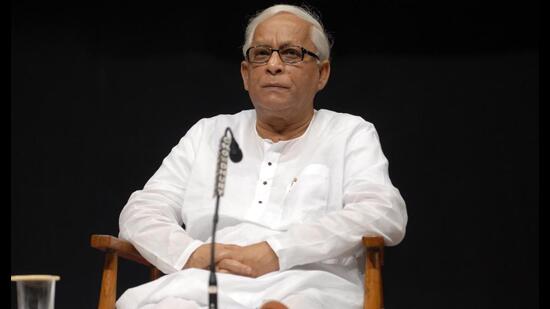Aug 08, 2024 09:22 PM IST
Buddhadeb Bhattacharya was an ardent idealist, a Communist with impeccable credentials. He was sincere, he was honest, and his life was simple, if not austere
Buddhadeb Bhattacharya, West Bengal’s last Communist chief minister (2000-2011), was a contradictory composite of dreamer and doer, liberal and Communist, poet and politician. He was a success and a failure. Even when he withdrew from public life, for health reasons, he was a leader and a powerful presence in West Bengal’s politics.

He was the Communist Party of India-Marxist (CPM)’s “tallest leader,” an inspiring presence who, even in his isolation, electrified the masses. In 2019, the CPM-Left Front held a large public rally at Kolkata’s sprawling Brigade Parade Grounds. Bhattacharya was not billed as a speaker, because his health did not permit it. But he came, pulled by the need to stand in solidarity. His arrival stirred the crowds; everyone wanted to see him. He sat in the car and soaked in the spirit of the massed audience. It was his first public appearance after three years, and his last.
In 2011, when the CPM-led Left Front was comprehensively, if not humiliatingly, defeated by Mamata Banerjee’s Trinamool Congress, and Bhattacharya lost his Jadavpur seat, few held him responsible for the spectacular failure; his party, the organisation’s leadership, the rot that had penetrated deep into the structure were all blamed, and the popular perception was that it was a punishment richly deserved. Bhattacharya became a tragic victim of his party’s misdemeanours.
The defeat pushed Bhattacharya to retreat from public life and party work. He eventually gave up his party positions and retired into semi-isolation as a member of the CPM. Why Bhattacharya lost even his own seat in the 2011 elections is a puzzle. The party he led lost the elections for reasons that were internal to it and the alienation from both the rural and urban voter bases. He had tried to stem the rot and failed. Banerjee’s challenge and her call for poriborton (change) had created an alternative political pole, raising expectations of an end to the exhausted Left Front era.
Bhattacharya had big plans for his beloved West Bengal. He set out in 2001, after winning a strong mandate from the people for his first full term as chief minister, to deliver on his promise of a rapid transformation of the state and its reinvention as an investment, industrial and cultural destination.
From being a supercilious anti-capitalist, he consciously changed tack. He was transparent about it, too. He said for West Bengal, its future, and to fulfil the aspirations of its young, educated millions, he would do what was needed to make change happen. In his memoirs, Bhattacharya reveals that he pondered over the ideological dilemma, studied China’s changed trajectory after Deng Xiaoping’s One Country, Two Systems formulation, and then was convinced by Amartya Sen, who cautioned him against “viewing globalisation as a monster.” He pointed to “the positive outcomes that globalisation could produce.”
There was a feverish urgency in his efforts between 2001 and about midway through his second term which ended in 2011. His slogan — Do It Now! — captured the spirit that moved him. It captivated the young and the old, those who had grown bitter and frustrated by the slowness of change, the driblets of investment in industry, and the political activism that clogged streets and made Kolkata very different from the other state capitals. His push to bring about a transformation in West Bengal was as much a reaction as a deeply felt responsibility.
In his impatience and impetuosity, Bhattacharya did not take into account the peculiarities of West Bengal. Former finance minister and economist Ashok Mitra was brutally clear-eyed; he said that the state had turned insular, and alienated itself in self-imposed isolation. Bhattacharya could not gauge the extent of the resistance that his dreams and ambitions triggered. The Singur-Nandigram resistance and the use of state violence and the CPM’s enforcers to quell it was his undoing.
His enthusiasm to jump onto the liberalisation reforms bandwagon to fast forward West Bengal’s economic reconstruction destabilised the networks of cross-cutting interests that had supported the CPM and the Left Front. He alienated the trade unions, upset the Muslim voters, and challenged the idea of the Left with its strong opposition to corporates, global capital, and comfort in old equations. It created the space for Banerjee to succeed after decades of fighting the CPM and losing every time. It did not help that the CPM as an organisation was going through a leadership crisis and that his policies were too different; the central leadership of the party rejected his plans and criticised his policies. While Bhattacharya was above criticism, his actions were not.
Bhattacharya was an ardent idealist, a Communist with impeccable credentials. He was sincere, he was honest, and his life was simple, if not austere. He was an intellectual, a playwright, author, poet and practical politician. He was a film buff, a cultured Bengali who loved poetry, the arts, literature and the streets as a space for public protests. He drank tea and smoked incessantly. He was private but very publicly engaged. In his passing, an era has ended.
Shikha Mukherjee is a senior journalist based in Kolkata.The views expressed are personal
Story Saved


